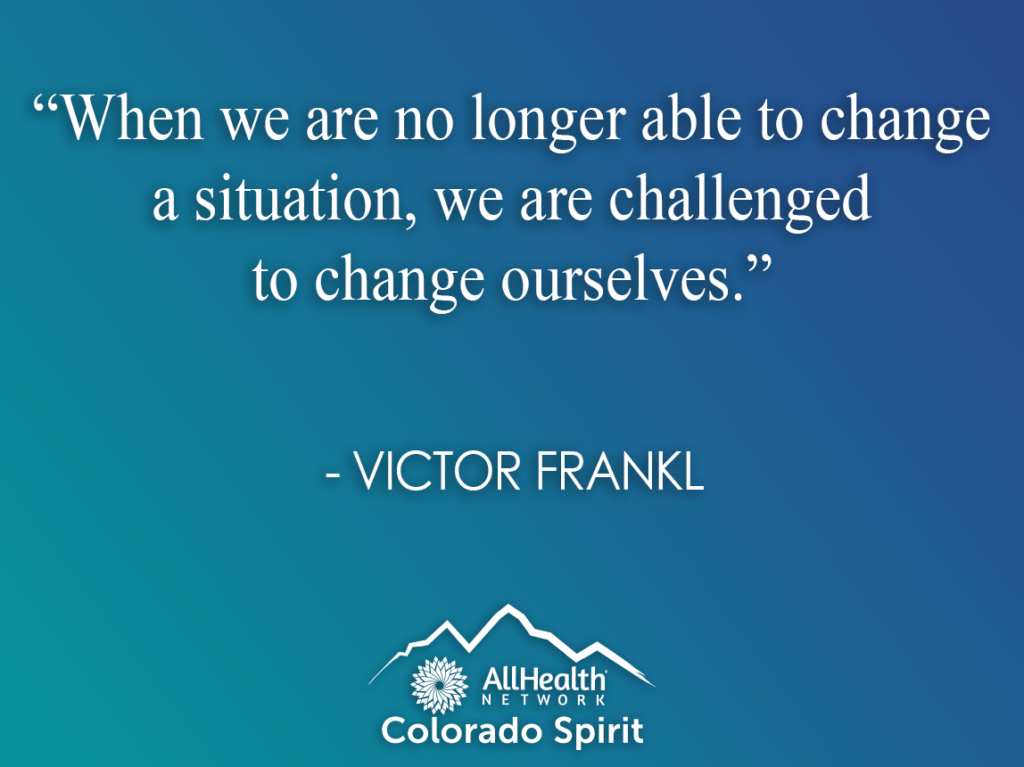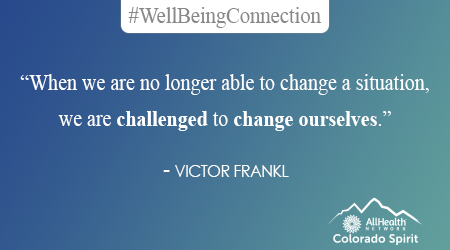Things are feeling more intense right now
I don’t know about you, but several of us on the Colorado Spirit team have noticed that things are feeling more intense right now. Between the change in weather, the huge challenges our state is facing with wildfires, the increase in COVID cases and hospitalizations in the state, pandemic weariness, and all the stress that comes with an upcoming election, lots of us are feeling zapped. While I know this is a completely understandable reaction to this completely abnormal time, it is still challenging. Lots of us are feeling a weight and heaviness that is not easy to shift out of.
As a person in the helping profession, my urge is to find something to “help” me feel better or have a different perspective. However, I don’t think it works that way during a pandemic. The stress and strain many of us are feeling seems to be something we need to find ways to tolerate for the foreseeable future. Back in May, we wrote a post about tolerating uncertainty and shared information about distress tolerance skills. Distress tolerance has been on my mind a lot lately. I typically view these skills as short-term ways to get through the moment without making it worse; now I have been trying to identify ways to expand my thinking about ways to tolerate distress for longer periods of time. We know there are no easy answers. Each of us has unique situations and will have different things that feel effective.
Here are some things that several of us have found helpful lately:
- Thinking about self-care differently – If you have not listened to it yet, we strongly recommend the recent Brené Brown Unlocking Us Podcast – about burnout. Brené speaks with Drs. Emily and Amelia Nagoski about how crucial it is to complete the body’s stress cycle and some straightforward ways to do this (hint: Breathing is on the list!). Brené shares that these tips have been a game changer for her and her family; we have to agree. Drs. Emily and Amelia Nagoski also highlight that self-care requires the support of others in our lives and challenge us to not try to do self-care in a bubble.
- Thinking about the Joy of Missing Out – Most of us have heard of FOMO (Fear of Missing Out) and there are lots of things many of us are missing right now. At the same time, finding ways to acknowledge and make space for any pleasant shifts in our lives can be important too. Maybe you have done something you would not have normally done because of the shifts in your day and activity level or maybe there are parts of your pre-pandemic routine that you are happy to take a break from. Experience JoMO shares some examples. We are not recommending that you just “look for the silver lining;” we are recommending you consider holding some space for acknowledging places you have found joy and things you do not miss so as to not solely focus on the challenges.
- Practice self-compassion – This one can be easier said than done, yet we know that just like with any skill, practice makes self-compassion come easier to us. Dr. Kristin Neff explains that “Self-compassion involves responding in the same supportive and understanding way you would with a good friend when you have a difficult time, fail, or notice something you don’t like about yourself.” She shares that to practice self-compassion we need to mindfully notice our suffering, respond to our suffering in a compassionate and way, and acknowledge that imperfection is a part of our human experience. The Center for Mindful Self-Compassion provides specific tips about ways to practice self-compassion during the pandemic.
- Keep up with the basics – sleep, balanced nutrition, movement, being mindful of media exposure, and connection with others – all boost our ability to navigate repeated stressors. It is tempting to dismiss these strategies as “too basic” for this point in living with the pandemic, and we know that the value and importance of these core practices is never diminished.
Would speaking to someone help?
To speak with someone in the Colorado Spirit Program about stress related to the pandemic, please call 720-707-6789 or visit our web page at www.allhealthnetwork.org/Colorado-Spirit
For information about other services at AllHealth Network or to get connected with ongoing behavioral health support, please call: 303-730-8858.
AllHealth Network is continuing to provide service via telehealth or by phone and our Crisis Walk-in Center remains open 24/7. To learn more about what other community mental health centers are doing, please visit The Colorado Behavioral Health Council COVID-19 website.
If you are experiencing a mental health crisis and are in need of immediate assistance, please call the Colorado Crisis Hotline at 1-844-493-TALK (8255) or text TALK to 38255



